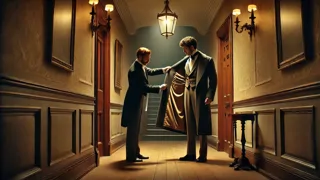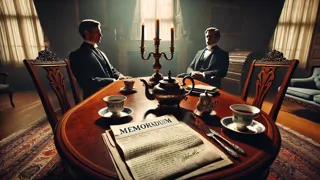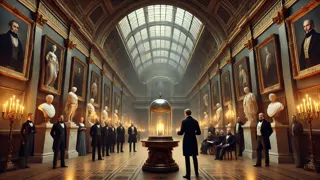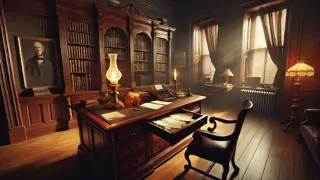Introduction
On a crisp autumn evening in a grand townhouse nestled among the brownstones of New York City’s Fifth Avenue, a discreet panic rippled through the corridors of power. The Governor General’s private study, illuminated by a lone oil lamp and lined with mahogany shelves, had been breached. Within minutes, word rippled outward to the finest minds of the city: a highly confidential letter—bearing secrets that could alter alliances and topple reputations—had vanished without a trace. The local constabulary, unaccustomed to matters of such delicate importance, combed every drawer, questioned every servant, and sealed off the mansion’s entrance. Yet, for all their uniformed zeal, they were no closer to recovering the missing correspondence. It was then that agents of the state, at their wits’ end, turned to a shadowy figure known only to a few as the world’s sharpest mind: C. Auguste Dupin.
Summoned by a cryptic telegram, Dupin arrived under the cover of midnight, his silhouette framed by flickering lantern light. His eyes, keen and calculating, surveyed the elegant disarray of the study: the faint smudge on the rug by the desk chair, the slight misalignment of books on the neighboring shelf, the perfume of cigar smoke lingering near a bust of Athena. Throughout the night, Dupin methodically retraced every step, probing the minds of witnesses with gentle questions, observing their smallest gestures. By dawn’s glow, he had conceived a theory so subtle it might elude even the most disciplined mind.
Though his methodology was veiled in an almost dreamlike quality—seemingly intuitive yet grounded in precise logic—Dupin was no magician. His was a skill born of observation and the uncanny ability to place himself within another’s mind, anticipating misdirection and deceit. The Governor General, pacing in his drawing room, anxiously awaited a solution. With quiet confidence, Dupin silently invited the astonished constable and two high-ranking aides into the dimly lit study for a demonstration of his reasoning. None could have foreseen how far he would bend perception before revealing the elusive letter. His plan, executed at twilight’s hush, would expose the stolen missive hidden in plain sight—and in doing so, secure justice for an office and a country that relied upon the secrets it kept safe.
I. The Invisible Trail
Detectives and officials often overlook the most obvious hiding places. Dupin recognized that the very thoroughness of the search rendered many secrets invisible, masked by an excess of scrutiny. He asked the Governor General’s chief valet to recount every detail of the evening before the letter disappeared. The valet described the distinguished visitor—a diplomat from Washington—who lingered too long by the desk, his gloved fingers brushing the drawer’s edge.

Rather than focusing on forced entries or elaborate concealments, Dupin observed the subtle anomalies: a slight bow of a floorboard, the consistent alignment of a paperweight beside a half-empty inkwell, the precise folds of a silk handkerchief resting on a side table. When the guest departed, he did so with a deceptive ease; the valet swore he carried nothing more than a parcel of documents. Yet Dupin identified an imperceptible crease in the guest’s coat—one that suggested the bulky shape of a folded letter.
As daylight filtered through lace curtains, Dupin turned his attention to the letter’s intended path. Had the diplomat acted alone, or was an accomplice waiting beyond the garden wall? Dupin considered motives forged by political intrigue, secret alliances that spanned continents. A brilliant mind might piece together treaties and betrayals hidden within the letter’s delicate script.
His plan crystallized in the hush of midday: he would provoke the thief into revealing his concealment. By discreetly warning the Governor General that an accomplice remained in the house, the real culprit would be driven to panic, abandoning the letter in haste. Dupin crafted a strategy as elegant as a chess master’s gambit—anticipating each response, predicting every fear.
As evening approached, Dupin arranged a subtle confrontation. The Governor General, feigning impatience, dismissed all but the valet and a single guard. Then, the flame of a single candle began to dance, and Dupin softly insisted on inspecting the diplomat’s coat one more time. Under the flickering glow, the hidden bulge beneath the fabric yielded without resistance. The valet, stunned, retrieved the mislaid correspondence. The letter, folded to conceal its wax seal, emerged from the glove compartment sewn inconspicuously into the coat’s lining.
II. The Mind of the Thief
No ordinary criminal hides a prize so meticulously. Dupin recognized that the thief’s intellect guided each step of the concealment, morphing theft into an elaborate psychological duel. In the aftermath of the letter’s recovery, he lingered at the scene, retracing the diplomat’s path through arcades, salons, and carriage entrances. Each setting offered its own risk—park benches beneath wrought-iron lamps, velvet-draped drawing rooms hung with ancestral portraits, narrow service passages lit by lantern-bearers. Yet at every turn, the thief trusted his own cunning more than the vigilance of others.

Dupin considered the diplomat’s background: a man educated in the salons of Europe, versed in classical rhetoric and clandestine operations. That education taught him to trust shadows and illusions, to mask his true intent behind courteous laughter and refined etiquette. To catch such a mind, Dupin realized, one needed more than brute force; one needed to reflect that intelligence, turning the criminal’s own faculties against him.
He drafted a confidential memorandum to a colleague in the State Department, hinting at a second letter of equal import, supposedly still lurking within the Governor General’s personal effects. Word of this forged document was leaked with just enough ambiguity to provoke the diplomat’s fear. Then Dupin orchestrated the perfect stage: a quiet parlor where tea was served at precisely half-past five, and a selection of major newspapers lay beneath the silver tray. The diplomat, summoned by official counsel, entered with an unsteady calm. He noticed the newspapers first, then the steaming silver teapot—only to freeze when he spotted Dupin’s folded memorandum peeking from under a corner of the Gazette.
Their eyes met across the polished mahogany table. Dupin offered a gentle smile. “You’ll forgive my precaution,” he said softly, sliding the memorandum into sight. “It appears discretion demands we confirm whether you have retained any additional correspondence.” He spoke with the tranquil voice of one presenting an academic hypothesis, not an accusation. Yet the diplomat’s composure cracked. His gloved hand trembled, revealing too much; he had allowed himself to believe he acted beyond suspicion.
Within moments, he bolted from his seat, fumbling his overcoat as he fled down the dim corridor. The valet, loyal and observant, intercepted him at the landing, pleading for an explanation. In the confusion, the diplomat’s coat slipped free, and the hidden pocket gave up its secret. Dupin retrieved the letter a second time, this one a misdirection of utmost subtlety. The room fell silent, save for the soft rustle of stiff silk fabric and Dupin’s own quiet satisfaction.
III. Justice in Plain Sight
By the time the moon rose over the city skyline, Dupin had orchestrated every element of the investigation to converge in one decisive moment. He invited the Governor General and his council to a secret viewing of the recovered letters in the stately gallery behind the mansion’s library. Pewter sconces cast a muted glow over oil paintings of battlefields and ancestral coats of arms as courtiers gathered in whispered excitement.

Dupin’s final revelation was less an astonishment than an elegant proof. He laid the purloined letter on a pedestal beneath a glass cloche, its wax seal intact and its contents intact. Around it, he arranged two decoy documents: one smoldered at the edge of a fireplace grate, the other carefully hidden beneath a tapestry depicting Athena’s triumph. The assembled statesmen and magistrates leaned forward, mouths agape, as Dupin explained his reasoning step by step. He spoke of human nature’s inclination to overlook the obvious, of how a triumphant mind could conceal secrets within the very flow of routine.
He demonstrated how the thief had exploited ordinary constraints: the valet’s rigid schedule, the porter’s unquestioning loyalty, and the governor’s trust in formal etiquette. By hiding the letter under the guise of routine garments, the diplomat had banked on everyone’s expectation that no gentleman would sully his attire with stolen goods.
With each revelation, the crowd’s shock deepened. Dupin concluded by handing the Governor General a secure envelope addressed to the President’s own desk, ensuring that both documents—original and decoy—would never fall into the wrong hands again. Political rivals in the audience exchanged uneasy glances; each realized that their own secrets might be just as vulnerable to a mind like Dupin’s.
That night, as the guests departed under a canopy of stars, Dupin himself slipped away into the shadows, leaving behind a ripple of newfound caution among those in power. The diplomat was quietly escorted to a distant station on the Hudson Line, bound for Europe under a discreet escort. No formal charges were ever announced; the public would later read only a brief dispatch about a thwarted act of espionage. Yet within the hush of official correspondence, Dupin’s victory echoed as a lesson in perception and the quiet triumph of justice.
Conclusion
In the days that followed, the city buzzed with rumors of the Purloined Letter, though the true details remained confined to the inner sanctum of power. Gentlemen whispered in private clubs, diplomats exchanged cautious nods at dinner tables, and the Governor General’s reputation soared for having contained a crisis of state. Yet it was Dupin alone who knew the quiet thrill of turning a cunning plot inside out, using the face of familiarity to catch the eye of perception. He returned to his modest quarters near the docks, content to observe the ebb and flow of commerce and conversation around him, his mind already alighting on new puzzles waiting in the twilight.
In an age where secrets were currency and trust a precarious commodity, Dupin’s method endured as a model of intellectual rigor. He proved that the greatest concealment lies not in shadows or locked safes, but in the most mundane details—where our expectations blind us and our assumptions betray us. And though the public would soon forget the names and faces entwined in this intrigue, the legacy of the Purloined Letter would live on in every vault unopened, in every drawer left unquestioned, and in every mind daring enough to look beyond what it sees. It was the pure triumph of reason, the subtle art of seeing the invisible, and a testament to the undying power of keen observation to reveal the hidden truths of the human heart and state alike. Once more, justice prevailed—not by force, but by finding what was in plain sight all along, and reminding us that sometimes the most elusive treasure is hiding where we least expect it: in our own familiarity with the world around us.


















